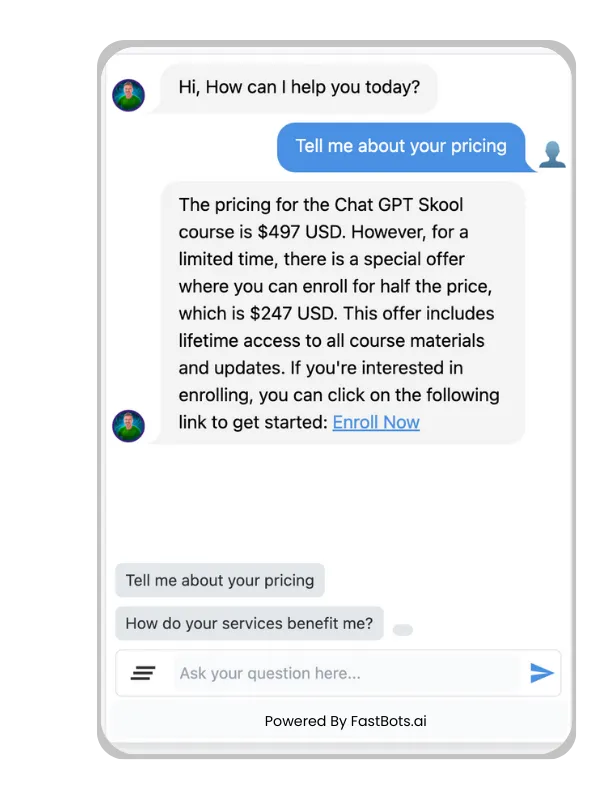As messaging services continue to impact various industries, healthcare is no exception. WhatsApp has become a prevalent tool in modern patient communication, with approximately 75% of people expecting to engage in messaging-based care with their healthcare providers by 2023. The ease of access and convenient communication offered by WhatsApp have proved invaluable, particularly in a post-pandemic world, with healthcare institutions adopting WhatsApp solutions to provide prompt and personalised support to their patients.
Choosing the right WhatsApp healthcare solution for your practice can greatly enhance the patient experience and streamline your workflow. To make the best selection, it is essential to consider factors such as compliance, security, and efficiency. In this article, we will guide you through the process of identifying the most suitable WhatsApp healthcare solution for your organisation, so you can maximise patient engagement and ensure effective collaboration within your team.
To create a powerful, secure, and efficient communication channel between healthcare providers and patients, it is important to focus on vital elements, such as ensuring the chosen solution complies with local and international regulations and has the capability to integrate with existing systems and tools already in use. Keep reading to learn more about the essential factors to consider when selecting a WhatsApp healthcare solution for your practice.
Understanding healthcare messaging needs
Identifying stakeholder requirements
Before choosing a WhatsApp healthcare solution, it's essential to understand the specific needs of your healthcare organisation. Outline the priorities and requirements of various stakeholders, such as patients, providers, and administrators. Creating a list of these needs will help guide your decision-making process.
1. Patients might value ease of communication, timeliness, and privacy.
2. Healthcare providers could emphasise simplicity, efficiency, and an integrated workflow.
3. Administrators likely need a scalable solution with reporting and analytics capabilities.
Regulatory Compliance and Security
The security of patient information is paramount in healthcare. Before selecting a WhatsApp healthcare solution, ensure it meets the necessary regulatory compliance standards, such as HIPAA in the US or GDPR in the EU. Investigate the app's data encryption, consent management, and secure storage features. Familiarise yourself with any applicable regulatory guidelines to ensure your chosen solution adheres to these standards.
Integration with Existing Systems
Integration with your organisation's existing systems is crucial to a successful WhatsApp healthcare solution. Your chosen solution should have compatibility with your electronic health record (EHR) system, appointment scheduling software, and other essential tools. Seamless integration with your existing systems will allow for streamlined workflows, reducing redundancies, and ensuring a smooth user experience for both patients and healthcare providers.
While choosing the right WhatsApp healthcare solution, keep these three factors in mind. Identifying stakeholder requirements, ensuring regulatory compliance and security, and integrating the solution with existing systems are integral to making an informed decision. By exploring these areas, you can confidently select a solution that suits your organisation's unique messaging needs.
Evaluating WhatsApp Solutions
User experience and accessibility
When choosing a WhatsApp healthcare solution, it's important to consider the user experience and accessibility for both patients and medical providers. The solution should be easy to use and navigate, with a clean and efficient interface. Consider the following points:
- Simplicity: Is it easy for patients and providers to learn and use the solution?
- Language support: Does the solution support the languages spoken by your patients and providers?
- Compatibility: Is the solution compatible with a range of devices and operating systems, including smartphones, tablets, and desktop computers?
Remember that superior user experience and accessibility can lead to increased patient satisfaction and medical personnel efficiency.
Feature Set Analysis
There are several key features to look for in a WhatsApp healthcare solution. Analyse the available features to ensure they meet your requirements. Some essential features include:
1.Compliance: Make sure the solution adheres to relevant healthcare regulations, such as HIPAA or GDPR.
2. Data encryption: End-to-end encryption is crucial for maintaining the privacy of patient information.
3. Appointment scheduling: the capability to book appointments and send reminders to patients through WhatsApp.
4. File sharing: allows secure sharing of diagnostic images, test results, and other critical documents.
5. Chatbots: AI-powered chatbots can help answer patient queries and provide assistance when medical staff are unavailable.
Don't forget to weigh the relative importance of each feature based on your organisation's unique requirements.
Support and maintenance
Lastly, pay attention to the level of support and maintenance provided by the solution vendor. A reliable WhatsApp healthcare solution should offer:
- Customer support: timely and efficient assistance from the vendor when required.
- Scalability: the ability to accommodate an increasing number of patients and providers as your organisation grows.
- Updates and improvements: Regular updates are needed to ensure the solution remains up-to-date with the latest industry standards and technological advancements.
By thoroughly evaluating WhatsApp healthcare solutions based on user experience, features, and support, you can confidently select the one that best meets the needs of your organisation.
THE EASIEST WAY TO BUILD YOUR OWN HEALTHCARE CHATBOT
In less than 5 minutes, you could have an AI chatbot fully trained on your business data assisting your Website visitors.
Considering patient privacy and data security
As you evaluate WhatsApp healthcare solutions, it's crucial to prioritise patient privacy and data security. To ensure the protection of sensitive patient information, consider these key aspects:
End-to-End Encryption
End-to-end encryption is a significant feature that WhatsApp offers, ensuring that patient data remains confidential and safeguarded from unauthorised access. This feature provides peace of mind to both healthcare providers and patients, as it prevents third parties from intercepting messages exchanged between them. Compared to traditional communication channels like phone and email, WhatsApp offers a more secure platform for healthcare communication.
Data Management Policies
In addition to encryption, it's essential to examine the data management policies of the WhatsApp healthcare solution you're considering. Ensure that the solution adheres to relevant regulations, such as the Health Insurance Portability and Accountability Act (HIPAA) for US-based providers or GDPR for providers in the European Union. Compliance with these regulations confirms that the solution effectively manages sensitive patient information and minimises the risk of data breaches.
Moreover, you should consider how the solution handles data storage, access, and deletion. It's crucial to have a clear understanding of who can access patient data, how long it's stored, and what procedures are in place for data removal. Being transparent about data management practices will help build trust with patients and enhance the overall experience when using a WhatsApp healthcare solution.
To sum up, when choosing a WhatsApp healthcare solution, keep patient privacy and data security at the forefront of your decision-making process. Select a solution that offers end-to-end encryption, complies with relevant regulations, and demonstrates robust data management policies.
Analysing Vendor Reputation and Reliability
Choosing the right WhatsApp healthcare solution requires careful consideration of the vendor's reputation and reliability. By focusing on their market presence and expertise, as well as examining client testimonials and case studies, you can make a more informed decision in selecting the most suitable solution for your healthcare organisation.
Market Presence and Expertise
When assessing a vendor's reputation, it's essential to examine their market presence and expertise. Look for established vendors who have been in the field for a significant amount of time and have proven experience in providing healthcare solutions. Additionally, check if the vendor has a strong user base, as it indicates their solution's popularity among healthcare professionals. You can also verify their expertise by researching the following:
- Industry awards and recognitions: Accolades from respected organisations showcase the vendor's commitment to excellence and innovation.
- Partnerships with other industry leaders: Collaborations with reputable companies suggest that the vendor is trusted by their peers.
Client Testimonials and Case Studies
Client testimonials and case studies are invaluable sources of information to gauge a vendor's reliability. They provide first-hand experiences and insights into how the vendor's solutions work in real-life healthcare settings. To assess the efficiency and effectiveness of the vendor's WhatsApp healthcare solution, consider these points:
1. Client feedback: Look for testimonials from healthcare organisations of various sizes and specialties, as it demonstrates the solution's adaptability across the industry.
2. Case studies: Study the case studies to identify the specific challenges faced by other healthcare providers and determine how the vendor's solution helped overcome them.
3. Performance indicators: Pay attention to factors like patient satisfaction, response times, and cost efficiencies, as these are crucial components of an effective healthcare solution.
Taking the time to analyse a vendor's reputation and reliability through their market presence, expertise, client testimonials, and case studies can guide you in choosing the most appropriate WhatsApp healthcare solution for your organisation. Remember to remain confident and focused on your needs while conducting your research, ensuring that you find a solution that aligns with your unique requirements.

Making an informed decision
Cost-Benefit Analysis
When selecting a WhatsApp healthcare solution, it's essential to conduct a cost-benefit analysis. Evaluate the potential return on investment (ROI) by comparing the costs of implementing and maintaining the solution against the anticipated benefits.
- Costs: Consider subscription fees, set-up costs, staff training expenses, and any additional charges for extra features or add-ons.
- Benefits: Assess the potential for improved patient communication, increased appointment adherence, and enhanced brand image. Additionally, take into account the time savings for your staff and the overall operational efficiencies.
While it may be tempting to opt for the least expensive option, focus on long-term value and growth potential. Evaluate various solutions in light of your specific context, resources, and objectives.
Scalability and future-proofing
Another critical aspect to consider is the scalability and future-proofing of the solution. To ensure you select a tool that can adapt as your organisation grows, consider the following factors:
- Capacity: Determine if the solution can handle the increasing volume of users and features as your operations expand.
- Integration: Evaluate whether the solution integrates seamlessly with your existing systems (e.g., electronic health records) or has the potential for future integration if required.
- Customisation: Assess the ease with which you can tweak the solution to suit your changing needs and preferences.
- Support and updates: Make sure the solution provider offers ongoing support and regular updates to stay current with industry advancements and changing regulations.
By taking the time to weigh these factors and make an informed decision, you'll ensure that your selected WhatsApp healthcare solution aligns with your organisation's goals and requirements, resulting in improved communication, streamlined processes, and a better patient experience.
Frequently Asked Questions
What factors should be considered to ensure patient confidentiality when employing messaging apps in medical contexts?
How does the WhatsApp Business API enhance communication within the healthcare sector?
In what ways can healthcare professionals utilise instant messaging without breaching GDPR regulations?
What are the best practices for maintaining secure patient data transfers via instant messaging platforms?
How can healthcare providers verify the reliability and security of their messaging service?
Are there any specific guidelines for doctors communicating with patients through messaging apps?
THE EASIEST WAY TO BUILD YOUR OWN HEALTHCARE CHATBOT
In less than 5 minutes, you could have an AI chatbot fully trained on your business data assisting your Website visitors.


